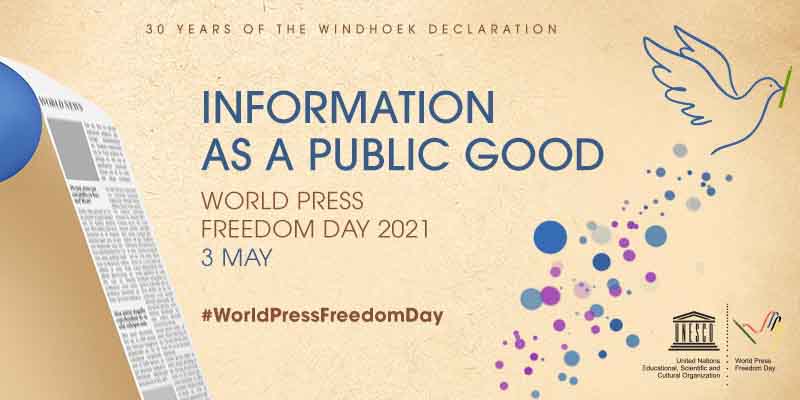- World
- May 03
Explainer / World Press Freedom Day
• The United Nations observes World Press Freedom Day on May 3.
• World Press Freedom Day was proclaimed by the UN General Assembly in December 1993, following the recommendation of UNESCO’s General Conference.
• Since then, May 3, the anniversary of the Declaration of Windhoek is celebrated worldwide as World Press Freedom Day.
• Over the years, the historic connection made between the freedom to seek, impart and receive information and the public good remains as relevant as it was at the time of its signing.
• May 3 acts as a reminder to governments of the need to respect their commitment to press freedom. It is also a day of reflection among media professionals about issues of press freedom and professional ethics.
It is an opportunity to:
• Celebrate the fundamental principles of press freedom.
• Assess the state of press freedom throughout the world.
• Defend the media from attacks on their independence.
• Pay tribute to journalists who have lost their lives in the line of duty.
This year’s theme
This year’s World Press Freedom Day theme “Information as a Public Good” serves as a call to affirm the importance of cherishing information as a public good, and exploring what can be done in the production, distribution and reception of content to strengthen journalism, and to advance transparency and empowerment while leaving no one behind.
The theme is of urgent relevance to all countries across the world. It recognises the changing communications system that is impacting on our health, our human rights, democracies and sustainable development.
30 years of the Windhoek Declaration
• The Windhoek Declaration is considered a benchmark for ensuring press freedom around the world.
• It all began at a seminar in Windhoek in 1991, but the ideas exchanged by African journalists and media professionals.
• The event ended on May 3 with the adoption of the landmark Windhoek Declaration for the Development of a Free, Independent and Pluralistic Press.
• It acted as a catalyst to encourage press freedom, independence and pluralism in Africa and in other parts of the world.
World Press Freedom Index
• The Paris based Reporters Without Borders (RSF) publishes a World Press Freedom Index (WPFI) annually.
• According to the 2021 World Press Freedom Index, which evaluated the press freedom situation in 180 countries and territories, journalism is totally blocked or seriously impeded in 73 countries and constrained in 59 others, which together represent 73 per cent of the countries evaluated.
• Norway was ranked first in the Index for the fifth consecutive year.
• India has been placed at 142nd rank in press freedom.
Press Council of India
• The Press Council of India is a statutory, quasi-judicial, autonomous authority.
• It was first constituted on July 4, 1966.
• A fresh legislation providing for the establishment of the Council was enacted in 1978.
• The Press Council of India was reestablished in 1979 under an Act of Parliament, Press Council Act, 1978 with the objectives of preserving the freedom of the press by maintaining and improving the standards of newspapers and the news agencies in India.
• The Council consists of a chairman and twenty-eight other members.
• The chairman is, by convention, a retired judge of the Supreme Court of India who is nominated by a committee consisting of Chairman of the Council of States (Rajya Sabha), Speaker of the House of the People (Lok Sabha) and a person elected from amongst themselves by the members of the Council.
• Of the 28 members, 20 represents a specially identified segment of press and eight members from varied fields representing the two Houses of the Parliament and premier literacy and legal bodies like University Grants Commission, Bar Council of India and Sahitya Akademi.
• The term of the office of the chairman and the members is three years.
• The Council discharges its functions primarily through adjudications on complaints received by it, either against the Press for violation of journalistic ethics or by the Press for interference with its freedom.
• National Press Day is observed in India on November 16.
Manorama Yearbook app is now available on Google Play Store and iOS App Store

